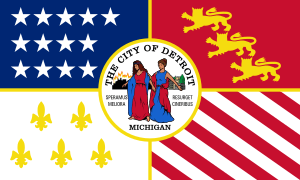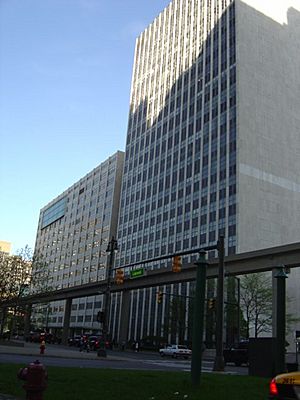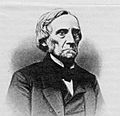Government of Detroit facts for kids

The city of Detroit, Michigan, has a special way of running its government. It's led by a mayor, a group of nine people called the Detroit City Council, and a city clerk. These leaders are chosen by the people in elections. Detroit uses a "strong mayoral" system. This means the mayor has a lot of power, like choosing who works in different city departments. The city council helps by approving the city's spending plans, also known as budgets. The city clerk is in charge of elections and keeping important city records safe. Big decisions, like new city laws or large contracts, must be approved by the council. City elections for these leaders happen every four years, after presidential elections.
City Departments
Detroit has several important departments that help the city run smoothly:
- Detroit Fire Department
- Detroit Police Department
- Detroit Public Schools
- Detroit Department of Transportation
- Detroit Water and Sewerage Department
City Money Matters

To pay for city services, Detroit collects money in different ways. One way is through property tax, which is paid by people who own homes or land. The city also collects an income tax from people who live or work there, and from businesses. Other money comes from taxes on things like utilities and hotel stays. The city also earns money from its Water and Sewer system, which provides fresh water and cleans wastewater for the whole area.
In recent years, Detroit has worked hard to manage its money. The city has tried to balance its spending and income. It has also planned to have fewer employees and make its operations more efficient.
However, the city faced some big financial challenges. On March 1, 2013, the state of Michigan decided to take over control of Detroit's money. The state wanted to see if an emergency manager was needed to help the city with its finances.
Soon after, on March 14, 2013, the state appointed a person named Kevyn Orr to be the Emergency Financial Manager. He started his job on March 25, 2013.
Later that year, on July 18, 2013, Detroit had to file for bankruptcy. This was a very big financial challenge for the city, one of the largest for a city in U.S. history.
Sister Cities
Detroit has special friendships with cities around the world, called sister cities. These connections help people from different places learn from each other.
 Toyota City, Japan
Toyota City, Japan Dubai, United Arab Emirates
Dubai, United Arab Emirates Turin, Italy
Turin, Italy Minsk, Belarus
Minsk, Belarus Kitwe, Zambia
Kitwe, Zambia Nassau, Bahamas
Nassau, Bahamas Chongqing, People's Republic of China
Chongqing, People's Republic of China
Detroit also shares a border with an international city:
Images for kids
 | Calvin Brent |
 | Walter T. Bailey |
 | Martha Cassell Thompson |
 | Alberta Jeannette Cassell |


